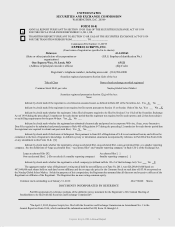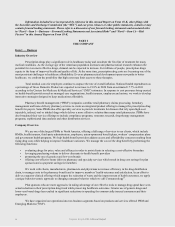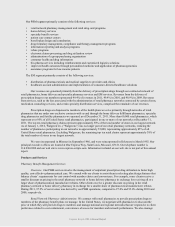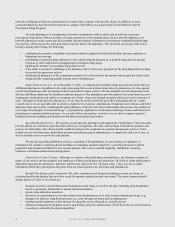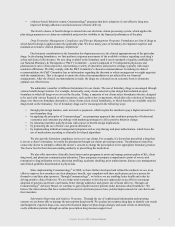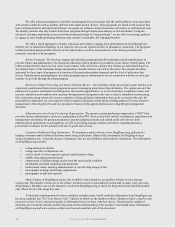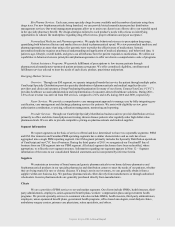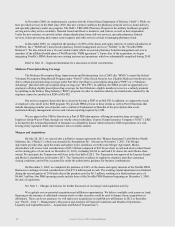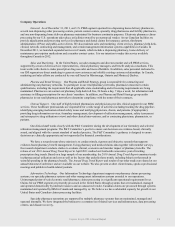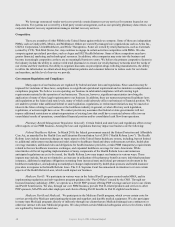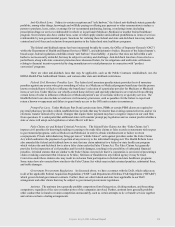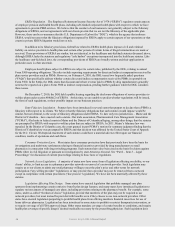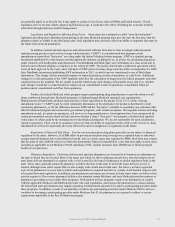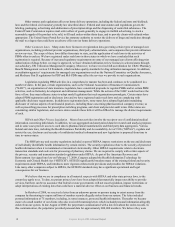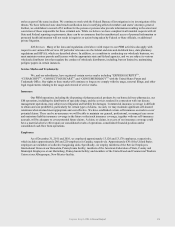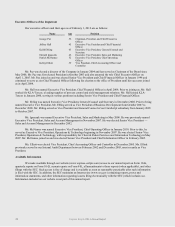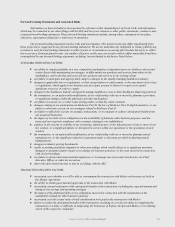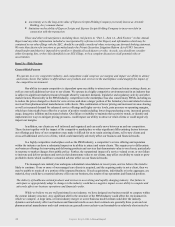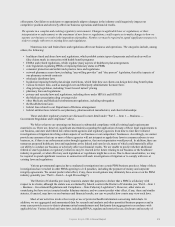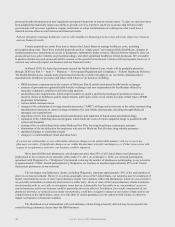Express Scripts 2011 Annual Report Download - page 16
Download and view the complete annual report
Please find page 16 of the 2011 Express Scripts annual report below. You can navigate through the pages in the report by either clicking on the pages listed below, or by using the keyword search tool below to find specific information within the annual report.
Express Scripts 2011 Annual Report
14
We leverage outsourced vendor services to provide certain disaster recovery services for systems located at our
data centers. For systems not covered by a third party vendor arrangement, such as our specialty pharmacy data centers, our
corporate disaster recovery organization manages internal recovery services.
Competition
There are a number of other PBMs in the United States against which we compete. Some of these are independent
PBMs, such as Catalyst RX, Medco, and MedImpact. Others are owned by managed care organizations such as Aetna Inc.,
CIGNA Corporation, UnitedHealthcare, and Prime Therapeutics. Some are owned by retail pharmacies, such as Caremark
(owned by CVS). Wal-Mart Stores, Inc. may continue to engage in certain activities competitive with PBMs. We also
compete against specialized providers, such as Argus and SXC Health Solutions. Some of these competitors may have
greater financial, marketing and technological resources. In addition, other companies may enter into the business and
become increasingly competitive as there are no meaningful barriers to entry. We believe the primary competitive factors in
the industry include the ability to contract with retail pharmacies to ensure our retail pharmacy networks meet the needs of
our clients and their members, the ability to negotiate discounts on prescription drugs with drug manufacturers, the ability
to utilize the information we obtain about drug utilization patterns and consumer behavior to reduce costs for our clients
and members, and the level of service we provide.
Government Regulation and Compliance
Many aspects of our businesses are regulated by federal and state laws and regulations. Since sanctions may be
imposed for violations of these laws, compliance is a significant operational requirement and we maintain a comprehensive
compliance program. We believe we are operating our business in substantial compliance with all existing legal
requirements material to the operation of our businesses. There are, however, significant uncertainties involving the
application of many of these legal requirements to our business. In addition, there are numerous proposed healthcare laws
and regulations at the federal and state levels, many of which could adversely affect our business or financial position. We
are unable to predict what additional federal or state legislation, regulations, or enforcement initiatives may be enacted or
taken in the future relating to our business or the healthcare industry in general, or what effect any such legislation,
regulations, or actions might have on us. We cannot provide any assurance that federal or state governments will not
impose additional restrictions or adopt interpretations of existing laws that could have a material adverse effect on our
consolidated results of operations, consolidated financial position and/or consolidated cash flow from operations.
Pharmacy Benefit Management Regulation Generally. Certain federal and state laws and regulations affect or may
affect aspects of our PBM business. Among the laws and regulations that may impact our business are the following:
Federal Healthcare Reform. In March 2010, the federal government enacted the Patient Protection and Affordable
Care Act, as amended by the Health Care and Education Reconciliation Act of 2010 (―Health Reform Laws‖). The Health
Reform Laws include numerous changes to many aspects of the United States healthcare system, including, but not limited
to, additional enforcement mechanisms and rules related to healthcare fraud and abuse enforcement activities, health plan
coverage mandates, additional rules and obligations for health insurance providers, certain PBM transparency requirements
related to the new healthcare insurance exchanges, and expanded healthcare coverage for more Americans. While
uncertainties still exist regarding implementation of many components of the Health Reform Laws and numerous
anticipated regulations are yet to be issued, the Health Reform Laws may impact our business in various ways. These
impacts may include, but are not limited to, an increase in utilization of the pharmacy benefit as more individuals purchase
insurance, additional compliance obligations stemming from increased state and federal government involvement in the
healthcare marketplace, and adjusting to marketplace changes implemented by health plan sponsors and health insurance
providers in response to the Health Reform Laws. The U.S. Supreme Court has announced its intention to review certain
aspects of the Health Reform Laws, which could impact our business.
Medicare Part D. We participate in various ways in the federal Part D program created under MMA, and its
implementing regulations and sub-regulatory program guidance (the ―Part D Rules‖) issued by the CMS. Through our
licensed insurance subsidiary, ESIC, we operate as a Part D PDP sponsor offering PDP coverage and services to our clients
and Part D beneficiaries. We also, through our core PBM business, provide Part D-related products and services to other
PDP sponsors, MA-PDs and other employers and clients offering Part D benefits to Part D eligible beneficiaries.
Medicare Part B and Medicaid. We participate in the Medicare Part B program, which covers certain costs for
services provided by Medicare participating physicians and suppliers and durable medical equipment. We also participate
in many state Medicaid programs directly or indirectly through our clients that are Medicaid managed care contractors or
otherwise interact with state Medicaid programs. We also perform certain Medicaid subrogation services for clients, which
are regulated by federal and state laws.



